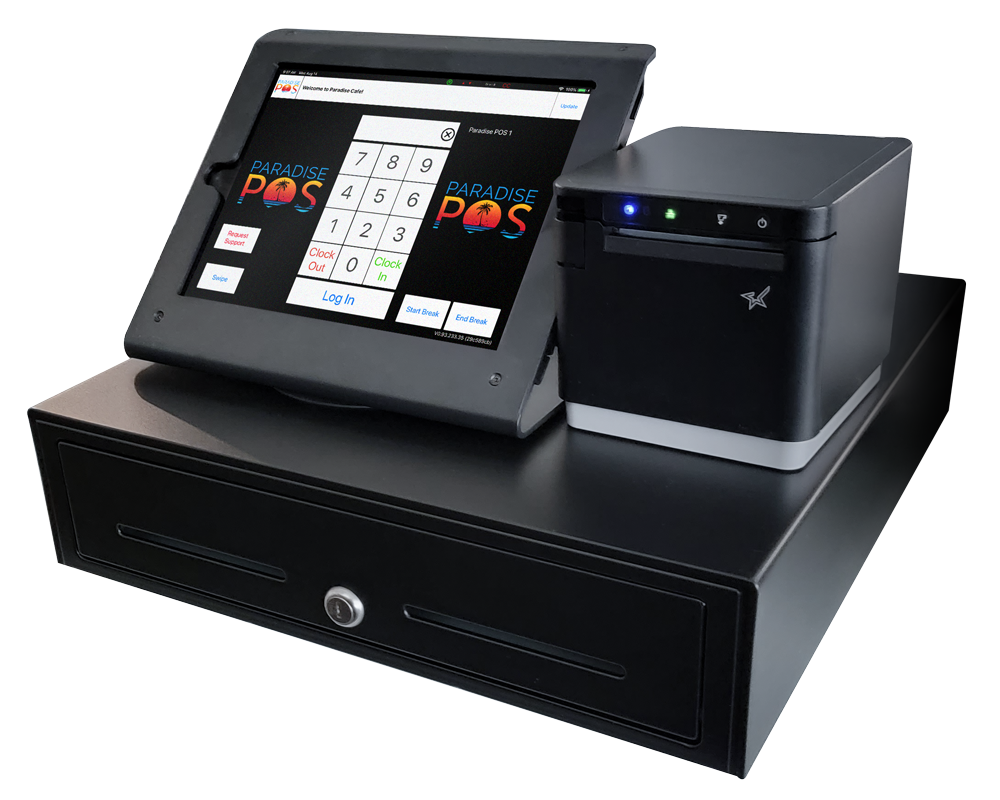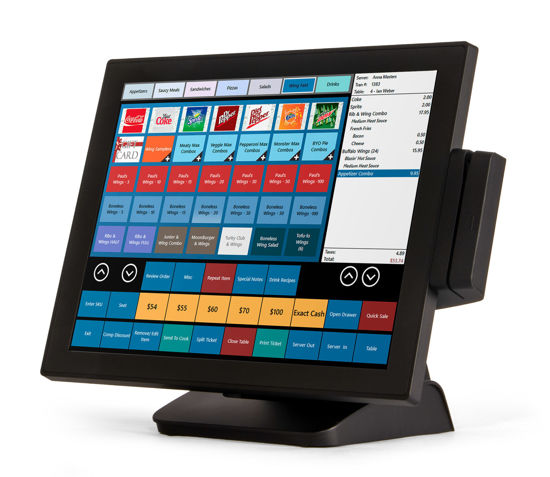Pos Software Things To Know Before You Buy
Pos Software Things To Know Before You Buy
Blog Article
The Best Guide To Point Of Sale

Point of Sale Software: Retail Point-Of-Sale Solutions Streamline Deals
Top Guidelines Of Point Of Sale Software

Hardware Components of a Point of Sale System What makes a POS system tick? It's not simply software application; the hardware plays a starring role. Think of it as the body to the software application's brain. Without the ideal hardware, even the most sophisticated POS software is simply a quite face. Vital POS Hardware So, what are the must-haves? Let's simplify. The main processing system, typically a computer or tablet, is the heart of the operation. The display or touchscreen show enables staff to communicate with the system. A barcode scanner speeds up the checkout procedure. Keep in mind the days of manually entering each code? The dependable invoice printer supplies consumers with a record of their purchase. A money drawer keeps your cash safe and organized. A card reader allows consumers to pay with credit or debit cards. Diving Deeper: Beyond the Essential However wait, there's more! Depending on your company, you might require specialized hardware. For example, a dining establishment may include cooking area printers to relay orders, while a store may utilize label printers for item tagging. Ever wonder how your local pastry shop instantly prints those delicious-looking labels? Picking the Right Hardware: A Balancing Act Picking the best hardware isn't practically purchasing the most expensive equipment. It's about discovering the sweet area in between performance, durability, and budget plan. A small company just starting out may select a more basic setup, while a high-volume merchant will need robust, high-performance devices. Is it better to purchase new or used? Consider your alternatives thoroughly. A brand-new system offers the latest innovation and service warranty defense, however a reconditioned system can save you money. The Future of POS Hardware What does the future hold? Anticipate to see a lot website more integration with mobile phones, biometric scanners for worker authentication, and advanced analytics control panels displayed on larger, clearer screens. Envision a world where stock is instantly upgraded in real-time as items are scanned-- a world where you can track your very popular product from anywhere in the world. The possibilities are unlimited, and the hardware is constantly progressing to fulfill the needs of today's services. Are you all set to upgrade your point of sale system?
Software Characteristics and Capabilities: The Heart of Your POS System
Ever see a skilled barista glide through a busy morning rush? Their trick isn't just caffeine; it's a seamless dance with their POS system. The software application is the conductor of your service symphony, managing everything from sales to stock. What notes should you be listening for? What capabilities really matter in today's market?
Inventory Management: Beyond Counting Beans
Forget spreadsheets that haunt your dreams. Modern POS systems offer real-time inventory tracking, informing you when your stock of artisanal coffee beans dips precariously low. Think of it as a digital guardian angel, avoiding those awkward "Sorry, we're out!" moments to clients. What if you could likewise predict need based upon historical information? Numerous systems now provide forecasting tools, a powerful weapon against overstocking and lost sales. This helps avoid the circumstance of running out of popular products or building up excess inventory of slow-moving products, both of which can constrain capital and area.
Sales Reporting and Analytics: Decoding the Information
Sales information is the new gold, and your POS system is the miner. Forget feeling in one's bones how much you sold today. Dive deep into the data to uncover trends, determine your very popular items, and understand consumer behavior. Which menu item sets completely with the day-to-day special? Which promotion resonated most with your clientele? These insights are not just interesting; they're actionable intelligence. Without dependable sales reporting, browsing the complexities of service decision-making becomes like sailing without a compass, increasing the chance of errors and missed out on chances.
Client Relationship Management (CRM): Structure Bridges, Not Walls
Keeping in mind a routine consumer's name and preferred order is lovely, however scaling that individual touch is tricky. POS systems with CRM capabilities enable you to track customer purchase history, choices, and even birthdays. Picture immediately providing a discount on their birthday-- a little gesture that promotes loyalty and motivates repeat company. However there is the potential snag of poor information quality, which can result in unreliable client profiles and inefficient marketing efforts.
Payment Processing: Streamlining the Deal
The checkout experience can make or break a sale. Seamless integration with numerous payment methods-- credit cards, mobile wallets, even copyright-- is non-negotiable. Can your system handle split payments? Does it offer secure tokenization to safeguard consumer information? A cumbersome payment procedure is like striking a sour note in your service symphony, possibly interrupting the entire efficiency. Guaranteeing compatibility with progressing payment innovations and adherence to security requirements are paramount for preserving customer trust and functional effectiveness.
Staff Member Management: Keeping the Group in Sync
From clocking in and out to handling authorizations and tracking efficiency, worker management features simplify operations and improve accountability. Is scheduling a nightmare? Many POS systems use integrated scheduling tools, enhancing staffing levels based on predicted need. A common obstacle that is often overlooked is the difficulty of incorporating worker management functionalities with payroll systems, which can lead to errors and ineffectiveness in wage estimations.
Advanced Features: Leveling Up Your Operations
- Table Management: Suitable for dining establishments, this function enables you to visualize your dining-room, track table status, and manage bookings.
- Loyalty Programs: Reward your finest consumers and encourage repeat business with integrated commitment programs.
- Online Buying Combination: Seamlessly integrate your POS system with online buying platforms to broaden your reach.
Selecting the ideal POS system is about more than just functionality; it has to do with discovering a partner that can grow with your company. Consider your current requirements, expect future development, and don't hesitate to ask the tough concerns. The best software application can change your company from a chaotic cacophony into a harmonious masterpiece.
Industry-Specific POS System Applications
Think about the local bakery, busy with morning customers yearning fresh croissants. A generic POS system might handle deals, but can it manage complicated dishes, track active ingredient stock, or immediately change production schedules based on sales information? Most likely not. That is where the beauty of industry-specific POS systems shines.
Dining establishments and Hospitality
For bustling dining establishments, speed and accuracy are vital. The number of times have you seen servers handling orders, adjustments, and splitting costs, all while trying to supply exceptional service? A restaurant POS system enhances these processes, enabling table management, kitchen order tickets, and even online purchasing combination. These systems frequently consist of functions like ingredient-level stock tracking, essential for handling food expenses and reducing waste. Ever question why your preferred dish is sometimes not available? It may come from a lack of appropriate inventory management.
- Table Management
- Kitchen Order Tickets
- Online Buying Combination
- Ingredient-Level Stock Tracking
Retail Solutions
Retail, with its diverse stock and client interactions, requires a various set of tools. Picture a shop clothes shop struggling to keep an eye on sizes, colors, and seasonal collections utilizing a fundamental checkout system. An industry-specific retail POS system provides features like barcode scanning, customer commitment programs, and comprehensive sales reporting. These systems can even incorporate with e-commerce platforms, supplying a seamless omnichannel experience for consumers. Did you know some retail POS systems can predict future sales patterns based upon historical information? Now that is powerful!
The Perils of a Mismatch
Selecting the incorrect POS system can create considerable functional obstacles. A clothes store utilizing a dining establishment POS, for instance, would find it inappropriate for managing inventory with sizes and colors. The lack of appropriate reporting and analytics might lead to mistaken buying choices and lost earnings. The outcome might be similar to trying to fit a square peg in a round hole.
Secret Factors to consider
Choosing an industry-specific POS system needs cautious evaluation. Think of your company's special needs and operational workflows. Does the system integrate with existing software application? Does it offer the needed reporting capabilities? Is it scalable to accommodate future growth? A well-chosen POS system is not simply a deal tool; it's a tactical property that can drive efficiency, improve consumer satisfaction, and eventually, boost your bottom line. Keep in mind, it is a financial investment in your business's future, not just an expenditure.
Security Considerations for Point of Sale Systems
Ever heard the tale of the mom-and-pop shop that lost everything because of a single, overlooked security flaw in their POS system!.?. !? It's a cautionary tale, and it highlights a vital aspect frequently eclipsed by the allure of expensive features and streamlined operations. The truth is, a POS system is just as good as its security. What excellent is a system that crunches numbers in a flash if it allows wrongdoers to swipe client's data simply as rapidly?
The Vulnerability Minefield
The digital landscape is a battleground. Every POS system, no matter size or elegance, is a possible target. Are you truly prepared for the hazards prowling around the corner? The real pinch comes when you find that your out-of-date software has an open hole that hackers can exploit, turning your business into an unwitting accomplice in identity theft. The problem is that hackers are crafty and are constantly altering their strategies.
Typical Security Gaps and Specialist Tips
- Weak Passwords: "Password123" isn't cutting it. Use strong, unique passwords for all POS system accounts and alter them routinely. Two-factor authentication is a must.
- Unsecured Networks: Your Wi-Fi resembles leaving the front door open. Secure your network with strong encryption (WPA3 if possible) and think about a separate network for your POS system.
- Out-of-date Software: Software vendors patch security holes all the time. Failing to update is like welcoming trouble. Set up automatic updates or schedule routine maintenance.
- Worker Training: Your staff is your first line of defense. Train them to recognize phishing attempts, protect passwords, and report suspicious activity.
Information File Encryption: Your Shield Against the Dark Arts
Consider data encryption as a secret code. It scrambles delicate info, like charge card numbers, making it unreadable to unauthorized users. Without encryption, your customers' monetary details resemble sitting ducks, ripe for the picking by cybercriminals. It's not simply about securing your consumers; it has to do with protecting your track record and avoiding hefty fines.
PCI Compliance: The Rulebook You Can't Overlook
If you accept charge card, you're bound by the Payment Card Market Data Security Requirement (PCI DSS) It's a set of security requirements created to secure cardholder data. Stopping working to comply can lead to fines, penalties, and even the loss of your ability to process charge card payments. It's a headache, yes, but it's a required one. Consider PCI compliance as the cost of doing company in the digital age.
Consider this: every deal processed through your point of sale is a prospective entry point for destructive stars. By implementing robust security measures, you're not simply protecting your service; you're safeguarding your consumers' trust and ensuring the long-term practicality of your operations. The security of your POS system isn't simply a technical problem; it's a business vital. It needs continuous alertness, proactive steps, and a commitment to staying ahead of the curve.